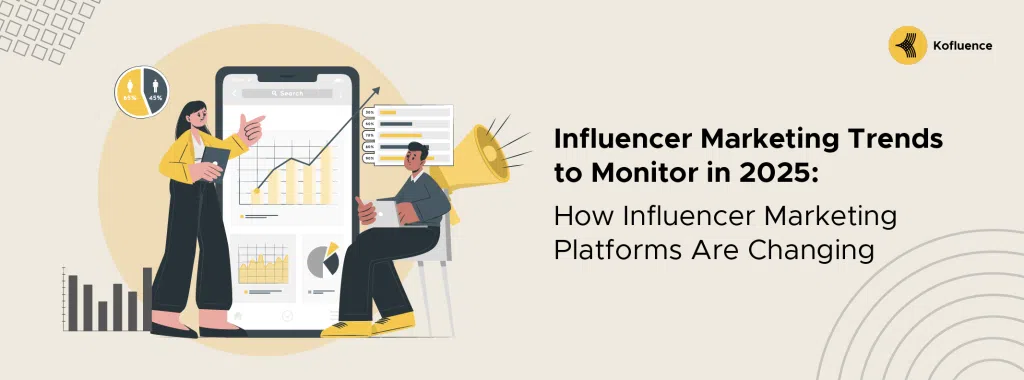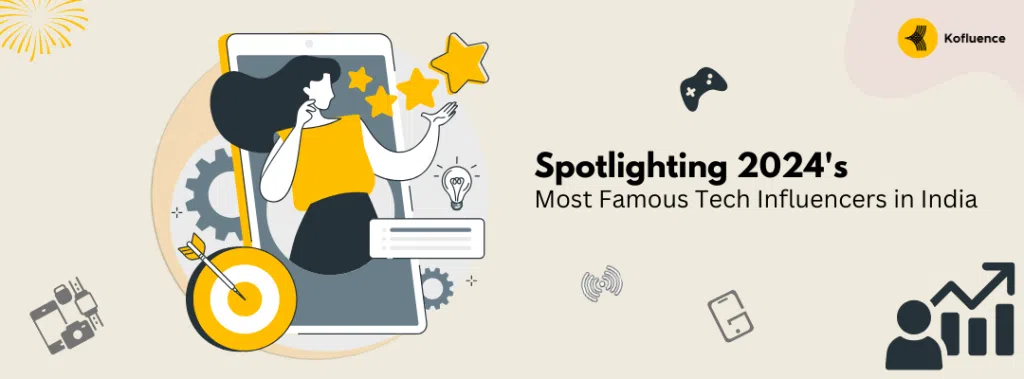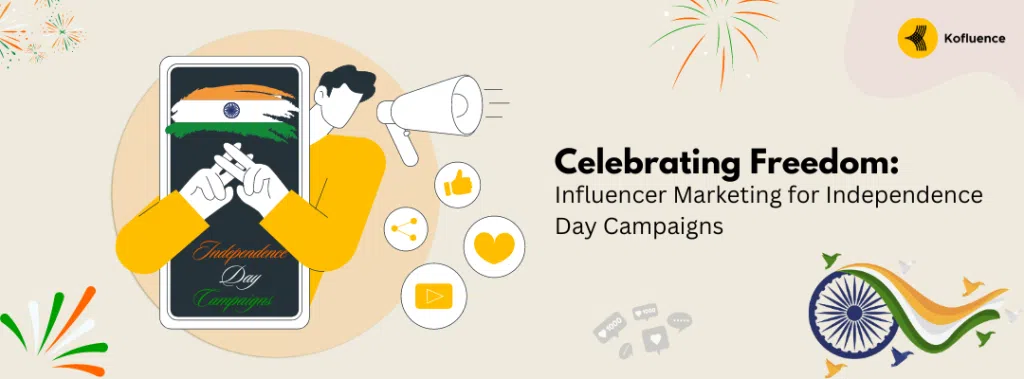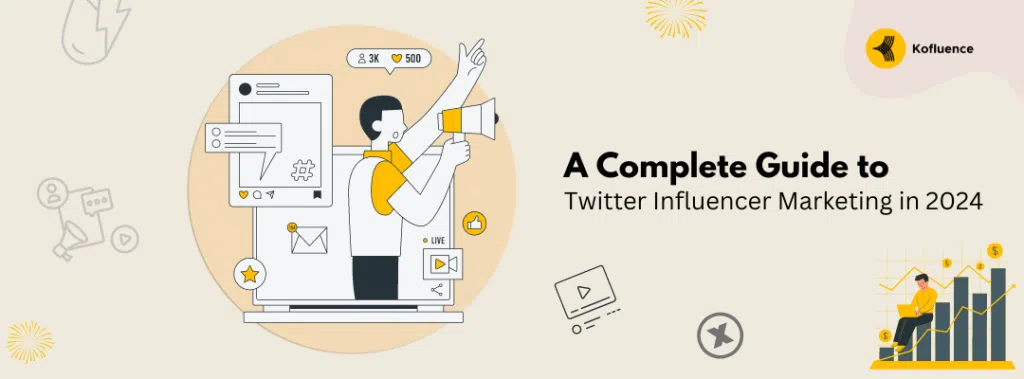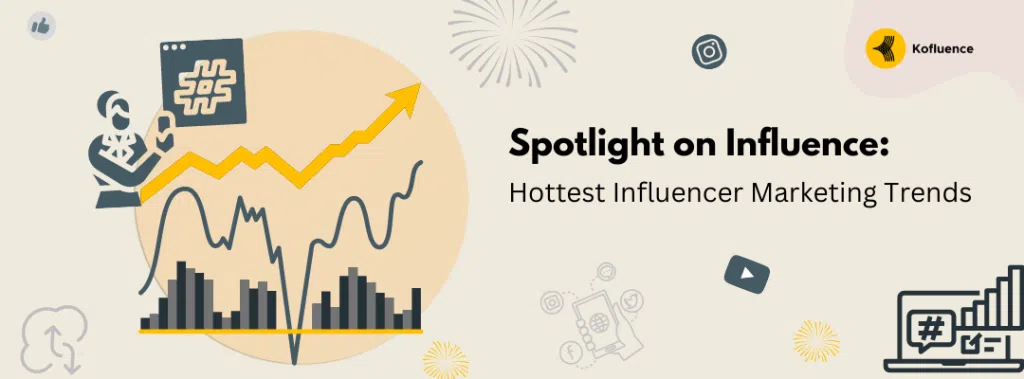Listen to Audio Blog
Table of contents:
Introduction
What is consumer loyalty in Influencer Marketing?
What’s the difference between Customer loyalty vs brand loyalty?
The Impact of Influencer Marketing on Brand Awareness And Loyalty
What are the key factors that influence customer loyalty and retention?
Integrating your influencer marketing strategy with your loyalty program
How do you build long-term influencer relationships from the get-go?
What are the challenges for customer loyalty in Influencer Marketing?
Conclusion
Introduction:
While scrolling through Instagram, we often see our favorite influencers or content creators endorse products in a highly attractive manner. This in turn would have convinced us to try said by purchasing it. This happens through the phenomenon of influencer marketing. It is a type of social media marketing that involves endorsements and product placements from influencers who have a sizable following on social media platforms like Instagram, YouTube, and TikTok. It is an effective method of marketing that is popular in this day and age, as the number of consumers of social media has increased dramatically. Gone are the days of turning on the television and finding advertisements in the middle of TV shows and movies.
What is consumer loyalty in Influencer Marketing?
While the traditional forms of marketing have almost become obsolete, the objectives remain the same. One of these includes improving consumer loyalty. To gain long-term success, brands need to have loyal customers. A loyal customer would not turn to any other brand for their requirements and would always prefer the same brand over and over. Having a strong, loyal customer base comes with many advantages, such as a positive brand image and increased sales. This is where influencers come in, as they play a crucial role in the endorsement of products that can make or break a brand’s reputation.
What’s the difference between Customer loyalty vs brand loyalty?
While discussing consumer loyalty in influencer marketing, it is also essential to distinguish between customer loyalty and brand loyalty. While customer loyalty relies on the probability of a customer returning to the same brand for their needs, brand loyalty takes the former a step further by not only working towards return purchases and increased sales but also an emotional connection between the customers and the identity, values, mission, and vision of the brand.
Many brands have managed to connect to the emotional core of their customers by creating idiosyncracies that are relatable to their target audience. This connection is reinforced by influencers who share similar values and self-expression. Glossier, Nike, Sephora, and Adidas are examples of Brands with Strong Consumer Loyalty in Influencer Marketing.
For instance, Glossier is a beauty brand that has built a loyal following by promoting a natural, effortless aesthetic that appeals to young, progressive women. Similarly, Nike has established a powerful brand identity centered around athletic excellence and empowerment, resonating with athletes and fitness enthusiasts worldwide. Sephora and Adidas have also positioned themselves as inclusive brands that promote self-expression and diversity.
Successful influencer marketing campaigns have enabled these brands to reach new audiences and reinforce their message of inclusivity and empowerment. By partnering with influencers who share these values, these brands have managed to create loyal followings and establish themselves as industry leaders.
The Impact of Influencer Marketing on Brand Awareness And Loyalty
Influencer marketing plays an instrumental role in the impact of brand awareness and loyalty. A superior approach to traditional marketing, it helps brands spread their wings and reach a larger audience while at the same time making it more targeted and focused. Brands, while using influencer marketing, rely upon the loyalty of their viewers. When the viewers are loyal to the influencers’ content, there is a higher likelihood that they will also trust the brand they endorse.
Brands can also take advantage of the emotional connection between the audience and their favorite influencers. Influencers provide a more personal connection and a sense of higher relatability that attracts their audience. When influencers make the same personal connection by promoting brands, it can lead to long-term customer loyalty and repeat business for the brand.
Furthermore, influencer marketing can improve exposure and brand awareness. A brand can achieve improved visibility and reach when they choose an influencer with a high social media presence and large following, preferably diverse. This can help brands to increase their social media following and attract new customers who may not have been aware of the brand before.
What are the key factors that influence customer loyalty and retention?
Overall, the factors that impact consumer loyalty in influencer marketing are:
Quality of Influencer’s Content:
Eye-catching content is essential to attract the viewership of consumers. Nowadays, the audience on social media favors good-quality, entertaining content that matches their personal aesthetic preferences or that of their favorite influencers. Such high-quality content provides a higher chance to capture and retain consumers’ attention. It also encourages viewers to engage with the influencer and their brand partners. Good editing, funny content, high video quality, etc. are some of the few preferences of viewers that can lead to a loyal following.
The Authenticity of the Influencer:
Authenticity stands at the core of influencer marketing as it has a direct impact on trust and loyalty. If influencers create authentic content which is real and natural, viewers will tend to trust them more. When viewers trust the influencers they follow, the brands they promote will also be seen as trustworthy. Influencers who make brand promotion look as if it is done for the sake of profit may lead to disengagement, which is why their authenticity must also be seen while doing the same.
Relevance of the Influencer’s Niche:
An influencer’s niche is related to the type of content they specialize in, as their forte leads to high audience engagement and builds a loyal following. Trust and consumer loyalty depend upon how relevant the influencer’s niche is to their audience. It would be quite unanticipated if an influencer whose niche is technology and gadgets begins to promote a fashion brand. Hence, the niche and the type of product to be marketed must be kept in check.
Frequency of Influencer’s Content:
Influencers must maintain consistency in content to keep their following active and engaged. Similarly, brands must choose influencers who have constant interaction with their audience so that they can leverage their viewership. Consistency in content helps followers keep up with the influencer’s brand and can create a sense of loyalty.
Integrating your influencer marketing strategy with your loyalty program
Integrating your influencer marketing strategy with your loyalty program can have a significant impact on consumer loyalty. Loyalty programs help push customers to buy products from the same brands, and brands can establish long-term relationships with their customers and increase sales. To harness the full potential of these strategies, it’s crucial to incorporate influencer marketing effectively.
By doing so, businesses can tap into the trust that influencer commands among their audience and leverage the influencer’s extensive reach and impact. But that’s not all – integrating a loyalty program with influencer marketing takes things up a notch, fostering even stronger customer relationships, deeper brand loyalty, and heightened customer engagement.
The synergy between influencer marketing and a loyalty program creates a powerful marketing approach. With this combination, businesses can optimize their chances of acquiring new customers, enhancing brand awareness, and ultimately achieving overall success in their endeavors. This cohesive and well-rounded marketing strategy paves the way for sustainable growth and greater customer loyalty.
Another benefit of integrating influencer marketing with a loyalty program is the potential to attract new customers. By partnering with influencers who have a substantial following and a strong influence over their audience, companies can tap into a whole new customer base that may not have been aware of their brand before.
The power of an influencer’s endorsement can’t be underestimated, as it has the potential to sway their followers and prompt them to try out a company’s products or services. The outcome of such collaborations is twofold: increased sales and heightened brand exposure, leading to coveted long-term customer loyalty.
If you’re wondering how to blend influencer marketing seamlessly with a loyalty program, here are some savvy strategies to consider:
Offering Discounts and Promotions:
One effective approach is to entice customers to join the loyalty program by providing them with special discounts and promotions. These incentives not only attract initial sign-ups but also encourage repeat purchases, driving customer retention and loyalty.
Uniting Forces with Influencers:
Brands can explore exciting opportunities to team up with influencers and create unique product bundles. This kind of collaboration generates intrigue among consumers, enticing them to purchase more products and, in turn, earn valuable loyalty points.
Showcasing Loyalty Program Benefits:
To showcase the perks of being a part of the loyalty program, influencers can create compelling content. From free products and exclusive event access to personalized recommendations, influencers can spotlight these benefits, effectively raising awareness and motivating potential customers to join.
Combining influencer marketing and a loyalty program creates a symbiotic relationship that benefits both brands and customers. On the one hand, brands can witness a surge in sales and foster lasting relationships with customers. On the other hand, customers feel appreciated and valued for their loyalty, which, in turn, deepens their connection with the brand.
By ensuring customer satisfaction and continuously engaging consumers, a loyal following can be cultivated, positioning the brand as a market leader and a prime example of leveraging influencer marketing to its fullest potential.
How do you build long-term influencer relationships from the get-go?
To do this, it is important to get in touch with influencers who have a genuine interest in what they do and are willing to collaborate with brands under an understanding of mutually beneficial partnerships. Brands should not look at influencers as a mere medium of marketing for their products but as a catalyst to their vision with their interests, values, and achievements. Therefore, brands should develop meaningful relationships with influencers that can work in the long term. An influencer’s loyalty toward a brand is just as important as a customer’s.
One factor that impacts consumer loyalty in influencer marketing is authenticity. Consumers are more likely to remain loyal to a brand if they perceive its marketing efforts as authentic and transparent. Brands that prioritize genuine partnerships with influencers and give them creative control over their campaigns tend to see more significant returns in terms of consumer loyalty.
Communication is another critical factor that can impact consumer loyalty in influencer marketing. Clear and regular communication between the brand and the influencer can establish a positive working relationship, showing the influencer that the brand values their input and insights. This communication should extend beyond the duration of a particular campaign, to maintain a lasting relationship with the influencer.
An important aspect of building relationships that have a long-lasting impact is consistency. It is always said that “Consistency is Key”, and stands true in this case as it helps in maintaining the dedication of the audience towards the influencer and the brand that their content. Moreover, consistency is not only key for influencers but for brands as well.
Brands that work with the same influencers tend to gain more attraction towards them as the audience has now familiarised themselves with the brand and what the influencer’s interests and preferences are. Brands will be able to etch themselves into the memory of the audience by establishing a social media presence that is unhindered.
What are the challenges for customer loyalty in Influencer Marketing?
Influencer marketing has its own set of challenges that can be overcome with enough practice and familiarity to engage audiences and nurture customer loyalty. Some of them are:
Authenticity vs. Commercialization:
While brands require influencers to push their products along with their features and perks as much as they can, influencers wish to be as authentic and natural as possible while making sure that their audience does not find their marketing content to be blatant and in the face. This is the challenge of authenticity and commercialization, where the content should neither look too laid back that it forgets to market nor too blatant that it loses its authenticity. Therefore, influencers and brands must be on the same page from a content standpoint.
Audience Relevance:
It is essential to find the right influencers whose audience is the right match for the brand. Their interests must align with the marketing interests. Brands must spend time to research, investigate and partner with the right influencers whose audiences genuinely resonate with their products or services.
Short-Term vs. Long-Term Impact:
Influencer Marketing campaigns often show immediate spikes in engagement and short-term benefits. However, the challenge lies in maintaining and nurturing customer loyalty over an extended period. A one-off collaboration might generate buzz, but sustainable customer loyalty demands continuous engagement and reinforcement through consistent efforts.
Transparency and Openness:
One critical aspect of influencer marketing is being transparent about sponsored content. Brands and influencers should be forthright in disclosing paid partnerships, as this helps build trust and authenticity among their followers. The genuineness of these collaborations directly impacts customer loyalty.
The Challenge of Oversaturation:
The growth of influencer marketing has led to a saturation of branded content on social media platforms. Consumers may experience fatigue from constant promotions, leading them to disengage from both influencers and brands. Overcoming this challenge requires a thoughtful content strategy that prioritizes creativity and relevance while avoiding overwhelming audiences.
Consistency in Brand Messaging:
Influencer marketing involves giving influencers some creative freedom over brand messaging, which can sometimes result in inconsistencies. To build customer loyalty, it’s crucial to ensure that influencers align with the brand’s values and maintain clear communication. This helps avoid confusion among consumers and strengthens the brand’s image.
Strategies to Enhance Customer Loyalty in Influencer Marketing:
Fostering Long-Term Relationships:
Building enduring partnerships with influencers is vital to nurturing customer loyalty. Rather than viewing influencers as one-time assets, brands should focus on establishing long-term connections. This approach taps into the authentic relationship influencers have with their audience, fostering trust and loyalty over time.
Co-Creating Content:
Involving influencers in the content creation process allows for a seamless integration of the brand’s products or services into their storytelling. This collaborative approach enhances the impact of influencer marketing and resonates more effectively with their audience.
Exclusive Offers and Appreciation:
To reinforce loyalty, brands can offer influencers’ followers exclusive deals and discounts. By showing appreciation for their support, brands make their audience feel valued and strengthen the bond between consumers and the brand.
Recognition through Ambassador Programs:
Developing ambassador programs that recognize and reward influencers for their consistent support fosters a sense of belonging and dedication. Offering exclusive perks and recognition strengthens the influencer-brand relationship and promotes customer loyalty.
Embrace Authenticity:
Encouraging influencers to genuinely choose products or services they believe in helps build trust with their audience. Authentic content resonates more deeply with followers and reinforces loyalty.
Harnessing the Power of Storytelling:
Influencers sharing personal stories related to the brand can have a profound emotional impact. This approach helps establish stronger connections with the audience and increases customer loyalty.
Honest Testimonials and Reviews:
Encouraging influencers to provide honest feedback about the brand’s products or services adds credibility and helps consumers make informed decisions, boosting customer loyalty.
Micro-Influencers for Greater Engagement:
Micro-influencers, with their highly engaged audiences, can be instrumental in building customer loyalty. Identifying influencers aligned with the brand’s niche and target audience leads to higher engagement and a receptive following.
Personalized Approach:
Interacting with micro-influencers directly through comments and appreciating their support strengthens the relationship and encourages loyalty.
Collaborating with Multiple Micro-Influencers:
Engaging with several micro-influencers allows brands to reach a wider audience and foster loyalty on a larger scale. This network amplifies the brand message across various niches and locations.
Data Analysis for Optimization:
Monitoring and analyzing data are crucial for optimizing influencer marketing strategies and ensuring customer satisfaction. Key performance indicators (KPIs), sentiment analysis, and A/B testing help identify effective approaches for generating higher customer loyalty.
Conclusion
To conclude, an instrumental strategy for pushing customer loyalty is influencer marketing. Brands can gain relationships and establish credibility by taking advantage of the connection that influencers have with their followers. Influencer audiences tend to be more focused on particular groups sharing similar tastes and interests, and campaigns leveraging such influencers can establish a better connection with brands, leading to increased levels of engagement and conversion.
For influencers, the audience is not seen as only viewers but is also seen as a community of people with similar interests. Therefore the brand that the influencer promotes, if promoted well, can see welcomed with a personal connection to both the influencer and the brand. It is an apt place to secure customer loyalty in a world where information and content are abundant and often cluttered.
The effectiveness of influencer marketing solely relies on how well the campaign and influencer promoting the campaign can create authentic relationships with its target audience. By doing so, a sense of trust can credibility can be created. Brands must find influencers whose content is in line with the brand’s values and vision, as it helps in creating a more meaningful impact on the customers, resonating with them on a deeper level. A lack of the same can lead to damage to the reputation of both the brand and influencer and can alienate the original target audience. Therefore, time must be invested and appropriate resources must be utilized to deliver correct influencer marketing strategies that are in line with the brand and consumer base.
To perpetuate the longevity of customer loyalty, brands must keep two important factors at the top of their list while shortlisting influencers- authenticity in content and trust in collaborations. Influencers must be carefully handpicked, and by doing so they can enjoy the fruits of genuine interactions and feedback. Brands can foster a sense of loyalty and credibility that will ultimately lead to sustained customer support. Furthermore, with the constant evolution of influencer marketing, brands must be on the lookout for more opportunities, trends, and new influencers that are impactful.
If you found this blog to be helpful browse through our website for other blogs on similar topics or get in touch with us for your next influencer marketing campaign! Download the Kofluence app and find relevant campaigns catering to your target audience! To opt-in, download the Kofluence app here: iOS users, and Android users.

